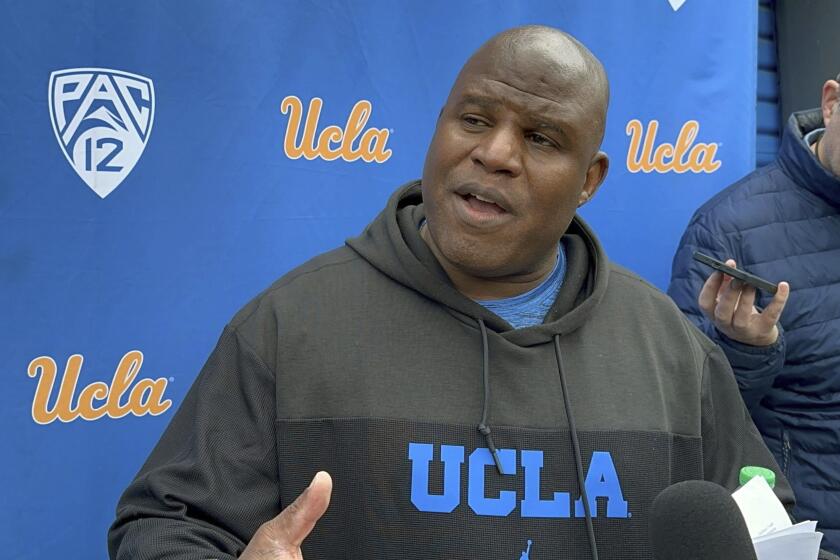Jones expected to admit doping
Marion Jones, the track and field star from Thousand Oaks who won five medals and worldwide fame at the 2000 Olympic Games in Australia, is expected today to become the most significant athlete to admit to using performance-enhancing drugs, after years of fiercely denying it.
Such an admission could lead to Jones’ being stripped of those medals.
The 31-year-old sprinter is scheduled to appear in U.S. Southern District Court in New York to plead guilty to charges connected to her steroid use before the 2000 Games, a federal law enforcement source told the Associated Press on Thursday. The official would not provide details and spoke on condition of anonymity because the investigation is ongoing.
The apparent plea bargain comes after years of accusations that Jones had boosted her performances with drugs, including an eyewitness account from Victor Conte, founder of Bay Area Laboratory Co-Operative, that she used a steroid known as “the clear” and knew what it was. In 2003, BALCO’s offices in Burlingame, Calif., were raided by federal investigators, and Conte later pleaded guilty to steroid distribution. Swept up in that scandal were a number of athletes, baseball star Barry Bonds and Jones among them.
In addition, Jones delivered a letter of apology to friends and family members, the Washington Post reported online Thursday. The newspaper said that in the letter, which it had not seen, Jones said she plans to plead guilty to two counts of lying to federal agents about her drug use and, in an unrelated case, for accepting a fraudulent check.
In the letter, which was read to the newspaper by a person who had received a copy of it, Jones reportedly said she indeed took BALCO’s steroid known as “the clear” for two years beginning in 1999. A person familiar with Jones’ legal situation and who requested anonymity confirmed the relevant facts in the letter, the Post said.
Attempts by The Times to reach Jones and her sprinter husband Obadele Thompson were unsuccessful, as were attempts to contact her personal attorney, Rich Nichols, her agent Charlie Wells and her former coaches, including Trevor Graham.
Darryl Seibel, a spokesman for the U.S. Olympic Committee, said the organization will intensely review any such plea bargain and could demand Jones return her medals.
“Doping is cheating and our position is unequivocal. It will absolutely not be tolerated,” he said. “Any athlete who chooses to cheat is making a decision that is a complete contradiction to what the Olympic movement stands for.”
Conte has long maintained Jones used performance-enhancing drugs. In a 2004 television interview, Conte said he personally injected Jones with human growth hormone before she raced at the 2001 Mount San Antonio College Relays in Walnut.
The sprinter, whose exploits at the Sydney Games caught the world’s attention after she won gold in the 100 and 200 meters, a gold and a bronze from two relay teams and a bronze in the long jump, wasted no time in filing a $25-million defamation suit against Conte. That lawsuit was settled last year.
“I gave Marion five separate drugs -- the clear, the cream, insulin, growth hormone and EPO -- after first meeting her in August 2000,” Conte told The Times on Thursday. “She used all five before the Olympic Games; she had full knowledge. If she doesn’t come forward and admit to using those five drugs, she’s not making a full disclosure.
“A Super Bowl linebacker I know once told me, ‘Once an athlete starts taking drugs, they become a liar.’ I’ve maintained Marion Jones used performance-enhancing drugs before, during and after the Olympic Games of 2000. I told the truth, and I continue to tell the truth.
“Marion made some decisions and there are consequences to those decisions,” Conte said. “That’s what she will now have to suffer. I feel sad for Marion, and her family, who will join her in that suffering.”
In the letter, Jones said she didn’t immediately know she was taking steroids, that Graham told her “the clear” was the nutritional supplement flaxseed oil and that she trusted him, according to the Post. Jones also said she “never thought for one second” the substance she was dropping under her tongue was a performance-enhancing drug until after she left Graham’s Raleigh, N.C.-based training camp at the end of 2002.
Graham later set up the BALCO raid by anonymously mailing the U.S. Anti-Doping Agency a syringe of “the clear.” More than a dozen track athletes have been linked to BALCO, as have baseball stars Gary Sheffield and Jason Giambi and boxer Shane Mosley.
Graham is awaiting a federal trial in November on counts of lying to federal agents.
“Red flags should have been raised when [Graham] told me not to tell anyone about” the supplement program, Jones said in the letter, according to the Post. The newspaper also said she admitted in the letter that she noticed changes in how her body felt and how she was able to recover from workouts.
Yet, those who doubt Jones’ veracity point out that she and her then-boyfriend, sprinter Tim Montgomery, left Graham to join track coach Charlie Francis, who had coached steroid-tainted 1988 Olympic gold medalist sprinter Ben Johnson.
Conte goes further, saying that Francis had attended BALCO’s “Project World Record” meeting in which a doping plan and schedule were openly discussed.
And Montgomery, who broke the men’s 100-meter world record in 2002, was later stripped of that record when he received a two-year ban for using performance-enhancing drugs.
After Francis, Jones turned to veteran coach Dan Pfaff before the 2004 Summer Games. Pfaff complained that Jones wouldn’t provide him with important medical lab test results and blood work that were crucial to his training regimen. Jones didn’t medal in 2004 and ultimately fired Pfaff, suing him for breach of contract.
Things quickly began to come apart. Nike ended its relationship with the sprinter. And Pfaff countersued, leading to Jones’ testifying in April that she was nearly broke, with “total liquid assets” of about $2,000. She owes Pfaff about $240,000 in unpaid training fees and legal expenses, according to court records in Dallas County, Texas.
“I want to apologize for all of this,” Jones reportedly said in the letter that was read to the Post. “I am sorry for disappointing you all in so many ways.”
Jones also reportedly said she planned to fly from Austin and meet her mother in New York to enter the plea; she said she faces up to six months in jail and will be sentenced in three months.
She also is still being investigated by the International Olympic Committee, which in 2004 began looking into her possible steroid use during the Sydney Games.
The track and field world was reeling Thursday as word of Jones’ situation spread.
“Anything that exposes the truth about drug use in sport is good for ensuring the integrity of sport,” USA Track and Field Chief Executive Craig Masback said. “While USATF has no knowledge of any letter or pending plea agreement regarding Marion Jones, we continue our long-stated support for the efforts of the U.S. Anti-Doping Agency and the federal government in their investigations. Any use of performance-enhancing substances is a tragedy for the athlete, their teammates, friends, family and the sport.”
Scott Davis, the former Mount San Antonio College Relays director whose meet hosted Jones from 1998 to 2005, said such an admission by the sprinter is “a major blow” for track and field.
“The drugs and the steroids have really hurt the sport, to the point that if anyone sets a record now, the first thing that comes to your mind is, ‘What are they on?’ ” Davis said. “It’s a difficult perception to crack. And this coming out now, before an Olympic year, is making it even more difficult.”
Jones, who has not raced this year, reportedly said in the letter that she lied about using “the clear” despite federal agents’ presenting her with a sample that she recognized as the substance she’d taken at Graham’s request. She lied, she said, because she panicked and wanted to protect herself and Graham.
Jones also said she lied about a $25,000 check given to her by Montgomery, who pleaded guilty in New York this year for his part in a multimillion-dollar bank fraud and money-laundering scheme that involved Jones’ recent coach, Steve Riddick, and her agent, Wells.
According to the Post, Jones said she told investigators she knew nothing about the deposit.
Times staff writer Helene Elliott contributed to this report.
lance.pugmire@ latimes.com
--
Redistributing wealth
If Marion Jones is to forfeit her five Olympic medals from the Sydney Games, the new medals list would read like this:
100 METERS
1. Marion Jones, United States
REVISED:
1. Ekaterini Thanou, Greece
2. Tayna Lawrence, Jamaica
3. Merlene Ottey, Jamaica
200 METERS
Marion Jones, United States
REVISED:
1. Pauline Davis-Thompson, Bahamas
2. Susanthika Jayasinghe, Sri Lanka
3. Beverly McDonald, Jamaica
LONG JUMP
3. Marion Jones, United States
REVISED:
3. Tatyana Kotova, Russia
400-METER RELAY
3. United States
REVISED:
3. France
1,600-METER RELAY
1. United States
REVISED:
1. Jamaica, 2. Russia, 3. Nigeria
More to Read
Go beyond the scoreboard
Get the latest on L.A.'s teams in the daily Sports Report newsletter.
You may occasionally receive promotional content from the Los Angeles Times.











